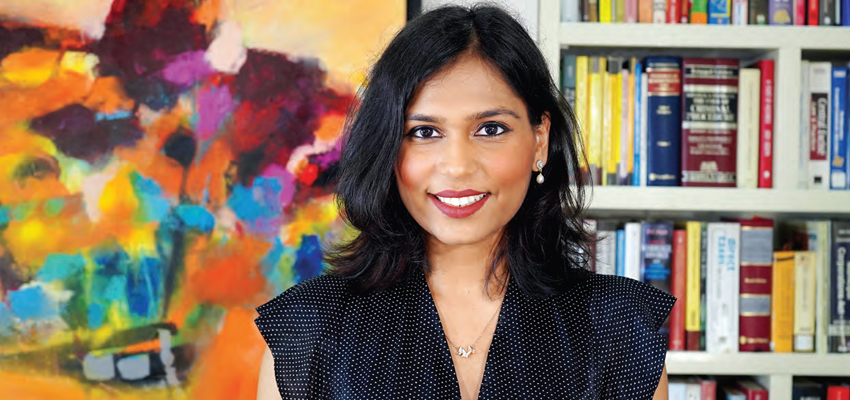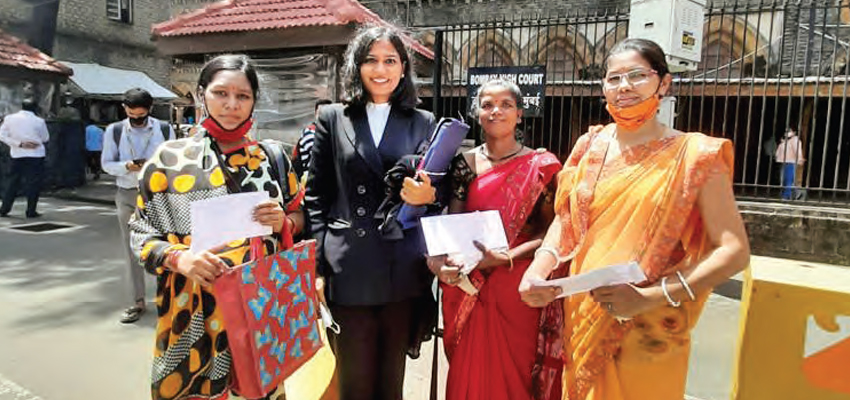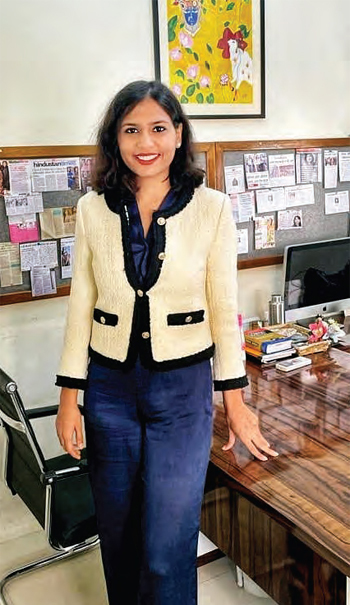NEVER LOSE SIGHT OF JUSTICE

She’s young, she’s diligent, and she is someone who will never lose sight of justice. Meet Isha Singh, who moved heaven to earth to fight for the rights of the widows of manual scavengers. Daughter of Abha, human rights activist and lawyer, and YS Singh, former police officer and activist, Isha through her maliciousness carved her path to success. She is a lawyer, and she recently qualified for IPS. In a conversation with Corporate Citizen, Isha opens up about her monumental case, her agenda when she takes up the post as an IPS and shares a few tips for aspirants who wish to take up law or civil services
Corporate Citizen: Give us a brief background about yourself.
Isha Singh: I was born and brought up in Mumbai where I went to the JB Petit School. I also studied in La Martiniere Girls College, Lucknow for a couple of years when my mother was transferred there and spent a few years in boarding school in Mayo College Girls School, Ajmer. I completed my schooling at the Cathedral and John Connon School, Mumbai and was fortunate to clear the CLAT and make it to National Law School, Bengaluru. I have always been inclined towards social justice, hence, law and civil services were a natural choice for me. I am currently practising in the Bombay High Court, where I deal with cases revolving around human rights, such as rights of manual scavengers, women at the workplace, sexual harassment, and bail matters. I received Rank 191 in the Civil Services Exam this year and I will be joining the Indian Police Service.
CC: It is said that the place you are born in plays a vital role in shaping your career and personality. Do you agree?
To some extent, I do agree with this philosophy. I was born and raised in Mumbai. This gave me an upper hand in terms of education, progressive ideas, and a safe environment. This city is full of enterprising people, it holds a deep respect for talent and is fairly open-minded. This has certainly shaped who I am. However, I think the greatest determiner of who you are and what you will become is an outcome of, what I like to call, ‘the fire in your belly’. Many times, we get lost in the cacophony of the world around us and ignore our inner voice and our grandest dreams. Those who are able to cut out the noise and chart their path lead the most fulfilling lives.
CC: How has the education that you’ve garnered acted as a catalyst in your professional journey?
My law school education was instrumental in introducing me to a critical thought process. It taught me how to question the world and all the knowledge that I had previously accepted as absolute. This has helped me in my legal career, as I am always open to new arguments and possibilities. It has never let disillusionment or fatigue creep in, and I am always ready to take on the most challenging cases. That is because I believe I will be able to find a solution, even when everybody around me is telling me that it can’t be done.
CC: Career-wise, you have been able to you follow in your parents’ footsteps. Now that you have carved your path of success through hard work and determination, what are your takeaways?
I have always been very inspired by my parents’ work. When my mother served the government, I travelled with her when she went for inspections. This exposed me to the many hues that our country has to offer. I saw my father do wonderful work while in the police, he fearlessly stood for the truth and the people. Similarly, as lawyers, my parents have undertaken a lot of public interest and pro bono litigation. I do feel very lucky to be born to them.
What I have learnt over the years is that the most important things in life are being true to your conscience and giving back to society. Many traditional indicators of success, such as money, power, and fame don’t guarantee a meaningful life but having a strong value system that pursues excellence, integrity and humanity certainly does.
"Always be clear about what you want and why you want it. It will ensure that you don’t waste your time chasing things that you don’t truly wish for. Once you make up your mind, never stop until you reach the goal"
 Isha Singh moved heaven to earth to fight for the rights of the widows of manual scavengers
Isha Singh moved heaven to earth to fight for the rights of the widows of manual scavengersCC: Talk us through your preparation for both Law and IPS exams. How did you burn the midnight oil to reach here?
The expression you’ve used is apt, as it does require burning the midnight oil. Law is a demanding profession, as is clearing the civil services exam. I had reached the interview last year as well but I wasn’t disheartened at all when I didn’t see my name on the list. Because I hadn’t been able to focus on the exam as much as I’d have liked. This time, I mentally made this exam my priority, so I took out time to study for it whenever I could. I made the best use of the lockdown, took leave before the mains, and wrote many tests. I did full self-study, as I didn’t feel coaching was helping me, but I did enrol for mock tests during the mains. I also relied a lot on past year question papers. This exam process has been an incredible journey for me as it has taught me to persevere, be consistent and have faith in myself. It has also compelled me to get out of the herd mentality, which I think is a problem that plagues many.
CC: Your determination to reach here is quite commendable. Moving on, when you begin your journey as an IPS what would be the first task that you’d like to undertake? And what do you wish to achieve at large?
The training starts in December, and postings will come after a few months of training. I decided to write the civil services because I believe the system needs motivated officers who dare to bring about reforms. As an IPS officer, I am going to focus on making police stations citizen-friendly. As a lawyer, I have noticed that there is a widespread reluctance to register FIRs in cognisable cases, which leaves the victims of the crime feeling extremely helpless. I would like to work on that as well. I want to focus on women and children safety too. The standards of prosecution in our country require improvement and I believe that can be aided by better investigation. I am hoping to use my knowledge of the law in this regard.
"Law is a demanding profession, as is clearing the civil services exam. I had reached the interview stage last year as well but I wasn’t disheartened at all when I didn’t see my name on the list. Because I hadn’t been able to focus on the exam as much as I’d have liked. This time, I mentally made this exam my priority, so I took out time to study for it whenever I could"

CC: Coming to your journey of pursuing law, you fought hard for the rights of the widows of manual scavengers. Against all odds, you managed to turn the tables. We are keen to know more about this case.
The media was constantly reporting the deaths of workers in septic tanks and sewers. To my mind, it was alarming that such a practice continues. What was even more shocking was that the BMC, in a reply to our RTIs, had stated that zero deaths had taken place in their department. We also discovered that Maharashtra had not paid Rs.10 lakh as compensations in even a single case of death, as mandated by the Supreme Court in 2014 in Safai Karamchari Andolan v. Union of India. When we read about yet another death in December 2019, we said enough is enough. My mother and I approached the widows and informed them of their rights under the law and asked them if they were willing to go to Court if required. They reposed their faith in us.
We first made a representation to the district collector, who was the appropriate authority, in January 2020. Nothing came out of it, and the lockdown only made their condition worse. When things become unmanageable, I transferred some money into their accounts and collected donations for them from civil society. The State didn’t come forward even once. Finally, it was the High Court that ordered that Rs.10 lakh compensations be paid to the widows. When the Court was pronouncing its Order, I felt so humbled, as I realised that the Constitution has entrusted lawyers with the lofty duties of ensuring liberty, equality, and fraternity for the people of our country. Justice is so important, and we must never lose sight of it. The widows were also sitting in Court when the Court was pronouncing its order, and they were given cheques of Rs.1.25 lakhs that day itself. They were in tears as they couldn’t believe that finally some semblance of justice had been served to them.
CC: You are right, we should never lose sight of justice. The world needs more people like you who see to it that justice is served. On the same lines, several students wish to appear for law or IPS exams, to serve our citizens and country. Any word of advice for them?
Always be clear about what you want and why you want it. It will ensure that you don’t waste your time chasing things that you don’t truly wish for. Once you make up your mind, never stop until you reach the goal. Law and civil services are great professions for those who are socially inclined, and I would particularly encourage more youngsters to take up law. A healthy bar is a sine qua non for a healthy democracy.
CC: When not working, how do you spend your time?
I really love to sing, so I take out the time to jam occasionally. I spend my free time catching up with my friends, writing on my blog or reading books. I also love to write opinion pieces on legal issues occasionally and make legal awareness videos with my mother on our Youtube Channel, The People’s Lawyer.
CC: What’s your philosophy in life?
I believe that one must always be true to themselves and live up to their highest potential. Life is a work in progress, so never give up. Become comfortable with failing because it indicates that you are striving. Learn from your failures, and one day, you will surely win. Have big dreams, make them happen, and never let anybody tell you that you can’t do it.